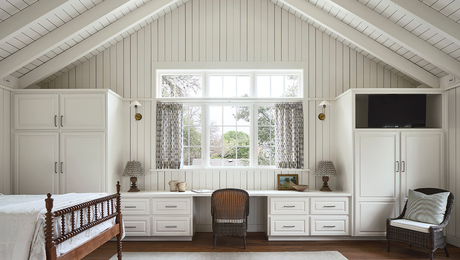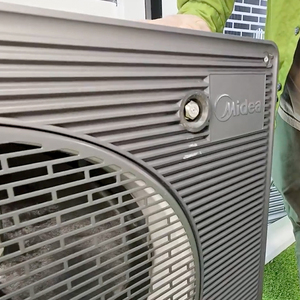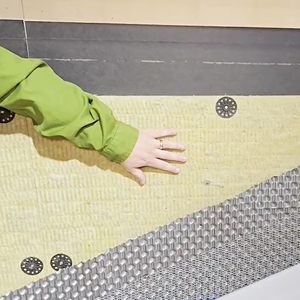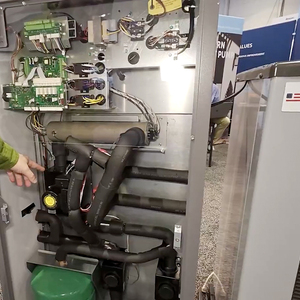I am buying a house in Utah that will be constructed as a single level on slab in southern Utah. I don’t like the heating and air to be run in a closet off the garage next to the living room. In the past I have found them to be loud when they run. Like putting your cooling compressor fan outside the master bedroom. How stupid is that? I always put them next to the garage. Can the heating system go in the attic and if so why not all of them in all single level homes? I had a house setup this way in the past and you never heard it. I assume due to the R-30 insulation. Also put the return vents in the ceiling in inconspicious locations. Does cold/snow weather effect a heating system in the attic?
Discussion Forum
Discussion Forum
Up Next
Video Shorts
Featured Story

This 654-sq.-ft. ADU combines vaulted ceilings, reclaimed materials, and efficient design, offering a flexible guest suite and home office above a new garage.
Featured Video
How to Install Cable Rail Around Wood-Post CornersHighlights
"I have learned so much thanks to the searchable articles on the FHB website. I can confidently say that I expect to be a life-long subscriber." - M.K.
Fine Homebuilding Magazine
- Home Group
- Antique Trader
- Arts & Crafts Homes
- Bank Note Reporter
- Cabin Life
- Cuisine at Home
- Fine Gardening
- Fine Woodworking
- Green Building Advisor
- Garden Gate
- Horticulture
- Keep Craft Alive
- Log Home Living
- Military Trader/Vehicles
- Numismatic News
- Numismaster
- Old Cars Weekly
- Old House Journal
- Period Homes
- Popular Woodworking
- Script
- ShopNotes
- Sports Collectors Digest
- Threads
- Timber Home Living
- Traditional Building
- Woodsmith
- World Coin News
- Writer's Digest


















Replies
Heating System in Attic
It is now widely accepted that placing your HVAC system in an unconditioned attic is a bad decision from an energy use point of view. In the Summer, all the cooled ducts will be heated by the hot attic. In the Winter, all the heated ducts will be cooled by the freezing attic.
If you must place your HVAC system in the attic, then you should place insulation in the roof joists. This is a more expensive proposition because the angled section of the roof is longer in length than the flat attic deck where insulation is normally place. For example, if the top of the ceiling joists measure 20 feet in width, and the roof is a 6/12 angle (33 degrees), then the combined length of the roof joists would be 23.8 feet in length.
Note: Placing the HVAC system in the attic also means you have to be extra careful about an overflow/leaking AC unit. You'll need a condesate line out to the outside plus a secondary condesate pan under the unit in case the first one gets clogged/blocked. An overflow alarm is also a good idea.
Additionally, it is MUCH harder to place insulation overhead vs just rolling it out on the attic deck. Really, spray foam is the only option that works overhead in terms of air sealing, and that is a very expensive proposition. However, in terms of energy, you'll recoup the additional expense of foam over leaky fiberglass over the life of the house.
It sounds like you are in the design phase of building your house. My recommendation would be either 1) bite the bullet and condition/insulate the attic and place the ducts there; 2) move the compressor away from the house (you can go up to 300' in some cases); 3) build the first floor ceiling 1 feet higher and place your ducts in that space, then insulate the attic deck conventionally.
Regardless of what option you choose, you MUST get a Manual D calculation done so that you get the right sized AC/HVAC equipment ($300-$450). Involve an HVAC technician early in the process in regards to moving the compressor away from the house.
Good luck.
Furthermore, the unit needs to be supported by framing that is somehow isolated from the ceiling joists, to avoid conducting vibrations through to the ceiling.
Thanks for the replies. I will take them into consideration. Why do builders put the Heating and air system next to a living space wall. They make a lot of noise. Why not put it against an exterior garage wall? Also the heating ducts run throughout the attic space so I don't quite get what the first reply is addressing other than a cold heating and air system and the condensation issues. Our last production home had the system in the attic on a pedistal above the ceiling beams and we never heard it running.
Well, in our case the furnace is in the utility room in the lower level of our split entry, adjacent to our bedroom. And none of the air ducts are in the attic.
yes
GregWarren wrote:
Does cold/snow weather effect a heating system in the attic?
Sure it does. To understand why, you just have to ask yourself, does it matter wearing a heavy coat while exposeing yourself to winter weather?